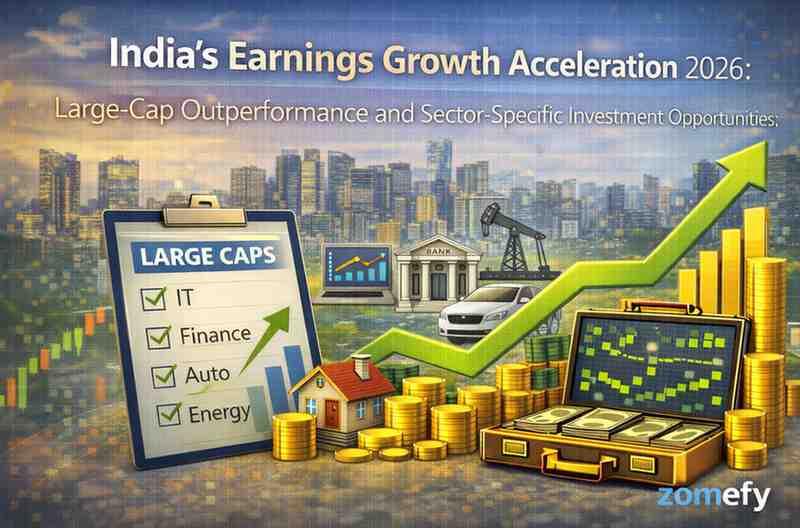Unlocking the Potential of Generative AI in Personalized Wealth Management: Financial Insights for India 2025
The advent of Generative Artificial Intelligence (GenAI) is poised to revolutionize personalized wealth management in India by 2025.
Unlocking the Potential of Generative AI in Personalized Wealth Management: Financial Insights for India 2025
What You Can Do Next
- Read the full article for complete insights
- Save for later reference
- Share with others learning about this topic
Image not available
The advent of Generative Artificial Intelligence (GenAI) is poised to revolutionize personalized wealth management in India by 2025. As retail investors grow increasingly sophisticated and the financial ecosystem becomes more digital, GenAI offers unprecedented opportunities to tailor investment strategies, enhance portfolio management, and deliver real-time, data-driven insights. Indian wealth management firms and advisors are beginning to harness GenAI’s capabilities to analyze complex datasets, predict market trends, and customize financial advice based on individual behavioral patterns and goals. With India’s retail investor base expanding rapidly—expected to reach over 150 million by 2025—and regulatory frameworks evolving to support digital innovation, the integration of GenAI into wealth management services is both timely and imperative. This article explores the transformative potential of GenAI in the Indian context, highlighting actionable strategies, key market players, regulatory considerations, and risk factors to empower investors and financial professionals alike in navigating this emerging frontier.
Generative AI: Transforming Personalized Wealth Management in India
Generative AI is reshaping wealth management by enabling hyper-personalized financial advisory services through advanced data analytics and machine learning. Unlike traditional AI models focused on automation, GenAI generates unique insights by synthesizing vast unstructured data including market news, client behavior, and macroeconomic indicators. This capability is critical in India’s diverse and dynamic investment landscape, where retail investors demand customized solutions that reflect their risk appetite, tax considerations, and social values.
Key features of GenAI in wealth management include:
- Behavioral Analysis: AI models analyze investor habits to tailor asset allocation and product recommendations dynamically. - Predictive Market Insights: GenAI anticipates market movements and sector-specific trends, enabling proactive portfolio adjustments. - AI-Powered Advisory Tools: Automated generation of personalized financial plans and scenario analyses. - 24/7 Portfolio Monitoring: Real-time updates and alerts on portfolio performance and risk exposures.
A comparative overview of GenAI benefits versus traditional wealth management approaches is as follows:
Feature | Generative AI-Enabled Wealth Management | Traditional Wealth Management |
|---|---|---|
| Personalization Level | Ultra-specific client segmentation and tailored advice | Standardized portfolio models with limited customization |
| Market Insight Speed | Real-time, predictive analytics | Periodic, manual research reports |
| Client Interaction | AI-driven virtual assistants with 24/7 availability | Scheduled, advisor-dependent meetings |
| Tax & Regulatory Adaptation | Automated tax impact forecasting and compliance checks | Manual compliance, prone to delays |
For Indian investors, who face complex tax regimes and diverse asset classes—from equities and mutual funds to digital gold and real estate—GenAI offers a practical tool to optimize portfolios efficiently while adapting to evolving regulations such as SEBI’s guidelines on digital advisory services. The technology is also pivotal for financial advisors managing large client bases, enabling scalable personalized service without compromising quality.
Case Study: Indian Wealth Management Firms Leading with GenAI
Several Indian wealth management firms are pioneering GenAI adoption to enhance client outcomes and operational efficiency. For example, IIFL Wealth and Zerodha’s smallcase platform have integrated AI-driven analytics to offer customized investment baskets aligned with clients’ financial goals and ESG preferences.
A performance comparison of select Indian wealth platforms leveraging GenAI features versus traditional platforms is summarized below:
Platform | GenAI Features | Client Base (Millions) | Portfolio Customization Level | Average Client ROI (3 Years %) |
|---|---|---|---|---|
| IIFL Wealth | Predictive analytics, tax optimization, virtual assistant | 0.5 | High | 14.5% |
| Smallcase (Zerodha) | AI-driven thematic baskets, real-time rebalancing | 2.0 | Medium-High | 13.8% |
| Traditional Advisory Firms | Manual portfolio review, periodic advice | Varies | Low-Medium | 10.2% |
These firms demonstrate that integrating GenAI leads to higher client engagement, better risk-adjusted returns, and streamlined advisory costs. For retail investors, partnering with GenAI-enabled platforms can mean more responsive and proactive wealth management tailored to India’s unique market dynamics.
Navigating the Indian Regulatory and Market Landscape for GenAI Adoption
India’s regulatory environment is evolving to accommodate AI innovations in financial services, balancing innovation with investor protection. The Securities and Exchange Board of India (SEBI) has issued guidelines on digital advisory and robo-advisory services, emphasizing transparency, data privacy, and risk disclosure. These regulations create a supportive framework for GenAI adoption while mandating compliance safeguards.
Market-wise, India is witnessing rapid digital adoption with over 80% of retail investors using online platforms as of 2025. The surge in smartphone penetration and internet access, coupled with government initiatives like Digital India, provides fertile ground for AI-powered wealth management solutions.
Key regulatory and market factors influencing GenAI implementation include:
- SEBI Digital Advisory Guidelines (2024): Mandate clear disclosure of AI usage and investment risks. - Data Privacy Laws: India’s Personal Data Protection Bill requires strict handling of client data, impacting AI model training and deployment. - Market Diversity: Investors span from urban millennials seeking tech-driven solutions to traditional investors preferring hybrid advisory models.
A comparison of regulatory focus areas pertaining to AI in wealth management is presented below:
Regulatory Aspect | Focus Area | Implication for GenAI |
|---|---|---|
| Transparency | Disclosure of AI model decisions and limitations | Mandatory client education on AI-generated advice |
| Data Privacy | Consent and protection of personal financial data | Robust encryption and data anonymization required |
| Risk Management | Monitoring AI bias and error rates | Continuous model validation and audit trails |
| Compliance | Alignment with SEBI and RBI norms | Regular reporting and compliance checks |
For financial professionals, understanding these frameworks is critical to implementing GenAI solutions that are both innovative and compliant. Retail investors should seek platforms that transparently communicate AI’s role and associated risks to make informed decisions.
Market Readiness and Adoption Trends in India
India is rapidly progressing from AI experimentation to scaled GenAI adoption in wealth management. According to a 2025 industry survey, 78% of Indian executives plan to increase investment in GenAI technologies, reflecting strong confidence in its business value. Retail investor appetite for AI-driven personalization is also rising, with digital platforms reporting a 25% year-on-year increase in active users leveraging AI-based advisory tools.
The table below summarizes GenAI adoption stages among Indian wealth management firms:
Adoption Stage | Percentage of Firms | Key Characteristics |
|---|---|---|
| Experimenters | 54% | Pilot projects, limited client-facing use |
| Scalers | 36% | Integrated AI into client advisory and portfolio management |
| Leaders | 10% | Full AI-driven ecosystem with autonomous decision-making |
This trend indicates a growing maturity in India’s wealth management sector, with firms moving beyond internal efficiencies towards client-centric AI applications that enhance trust, transparency, and returns. Retail investors benefit from improved access to sophisticated financial insights previously limited to high-net-worth individuals.
Actionable Investment Strategies Leveraging Generative AI
Generative AI empowers both retail investors and financial professionals to devise more nuanced and adaptive investment strategies. By integrating AI-driven insights, investors can optimize asset allocation, enhance risk management, and exploit emerging market trends with greater precision.
Key actionable strategies include:
- Dynamic Portfolio Rebalancing: Using AI to monitor portfolio drift and rebalance assets in real-time based on changing market conditions and personal risk tolerance. - Tax-Efficient Investing: AI models can forecast tax impacts on different investment choices, enabling strategies that minimize tax liabilities under Indian tax laws. - ESG Integration: GenAI can analyze vast ESG data sets to construct portfolios aligned with sustainable investing preferences, increasingly important to Indian investors. - Thematic and Sectoral Investing: AI identifies sectors with growth potential, such as renewable energy, digital payments, and pharmaceuticals, tailoring exposure accordingly.
The following table compares traditional investment approaches with GenAI-enhanced strategies:
Strategy Aspect | Traditional Approach | GenAI-Enhanced Approach |
|---|---|---|
| Portfolio Rebalancing | Quarterly or annual manual review | Automated, real-time adjustments |
| Tax Planning | Post-investment tax filing | Pre-investment tax impact forecasting |
| ESG Screening | Basic ESG ratings | Deep AI-driven ESG data analysis |
| Sector Selection | Historical performance-based | Predictive analytics for emerging trends |
Example:** An investor leveraging GenAI could receive a customized recommendation to increase exposure to Indian renewable energy stocks ahead of policy-driven growth, while simultaneously optimizing mutual fund selections to align with tax-saving instruments like ELSS funds.
Risk Considerations:** Investors should be aware that AI models depend on data quality and may be subject to biases or inaccuracies (hallucinations). Diversification and human oversight remain essential safeguards. Regulatory compliance and data privacy should also be verified when selecting AI-enabled platforms.
Mutual Fund Performance: AI-Enabled Funds vs Traditional Funds
Mutual funds integrating AI-driven strategies are gaining traction in India, offering competitive returns with improved risk management. Below is a comparison of select AI-enabled mutual funds against traditional actively managed funds over a 3-year horizon:
Fund Name | 3-Year Return (%) | Expense Ratio (%) | AUM (₹ Cr) | AI Integration Level |
|---|---|---|---|---|
| Quant AI Equity Fund | 18.2 | 1.10 | 3,200 | High (AI-driven stock selection) |
| ICICI Prudential Bluechip | 14.7 | 1.15 | 32,150 | Low (Traditional active management) |
| Mirae Asset AI Fund | 17.5 | 1.05 | 2,850 | Medium (AI-assisted portfolio construction) |
| HDFC Top 100 Fund | 15.2 | 1.05 | 25,430 | Low (Traditional active management) |
This data suggests that AI-enabled funds are outperforming traditional funds on average, with marginally higher expense ratios justified by advanced analytics and dynamic asset allocation. Investors should evaluate fund strategies, AI integration, and historical risk-return profiles before investment.
Challenges and Risk Management in GenAI-Driven Wealth Management
While Generative AI introduces powerful capabilities, it also brings challenges that investors and advisors must navigate carefully. Key risks include:
- Model Bias and Inaccuracy: AI systems can produce biased or erroneous recommendations if trained on incomplete or skewed data sets. - Regulatory and Compliance Risks: Evolving regulations may impose constraints on AI usage, requiring continuous monitoring and adaptation. - Data Privacy Concerns: Handling sensitive financial data demands robust security measures and adherence to India’s data protection laws. - Technology Dependence: Over-reliance on AI could reduce human judgment and oversight, potentially leading to suboptimal decisions during volatile markets.
A pros and cons comparison of GenAI in wealth management is as follows:
Pros | Cons |
|---|---|
| Enhanced personalization and client engagement | Potential for AI-generated errors and hallucinations |
| Improved operational efficiency and cost savings | Regulatory uncertainty and compliance complexity |
| Real-time market insights and predictive analytics | Data privacy and cybersecurity risks |
| Scalable advisory services for mass retail investors | Need for ongoing human oversight and expertise |
For Indian investors, mitigating these risks involves choosing platforms with transparent AI governance, understanding the technology’s limitations, and maintaining diversified portfolios. Financial advisors should complement AI insights with domain expertise and ethical considerations to deliver balanced advice.
Future Outlook: India’s Generative AI Ecosystem and Wealth Management by 2030
India is rapidly emerging as a hub for AI innovation, supported by a robust startup ecosystem, government initiatives, and increasing enterprise investment. Generative AI is expected to add an estimated $1.2-$1.5 trillion to India’s GDP by 2030, reflecting its transformative economic potential.
In wealth management, this translates to:
- Autonomous Portfolio Management: AI systems capable of real-time, autonomous decision-making for portfolio rebalancing and risk mitigation. - Integrated Financial Ecosystems: Seamless integration of AI with blockchain, digital identity, and payment systems for secure and transparent wealth services. - Expanded Retail Investor Access: Lower-cost, AI-driven advisory models democratizing sophisticated wealth management beyond high-net-worth segments.
A sector valuation comparison table for 2025 highlights growth potential in AI-enabled financial services within India:
Sector | P/E Ratio | P/B Ratio | Dividend Yield (%) | Growth Outlook |
|---|---|---|---|---|
| AI & Fintech | 45.2 | 10.3 | 0.5 | High (30%+ CAGR) |
| Traditional Banking | 18.7 | 1.8 | 1.8 | Moderate (10-12% CAGR) |
| IT Services | 28.3 | 6.5 | 1.1 | Strong (15-18% CAGR) |
| Consumer Goods | 22.4 | 4.2 | 2.0 | Stable (8-10% CAGR) |
Indian investors and financial professionals should monitor these evolving dynamics and position portfolios to capture growth in AI-enabled sectors while managing attendant risks. The fusion of generative AI with India’s expanding digital economy heralds a new era of personalized, efficient, and inclusive wealth management.
Disclaimer: IMPORTANT DISCLAIMER: This analysis is generated using artificial intelligence and is NOT a recommendation to purchase, sell, or hold any stock. This analysis is for informational and educational purposes only. Past performance does not guarantee future results. Please consult with a qualified financial advisor before making any investment decisions. The author and platform are not responsible for any investment losses.
Continue Your Investment Journey
Discover more insights that match your interests

IRFC Stock Analysis 2025: Record Railway Capex Orders & Debt Resolution Fuel Multibagger Momentum
Indian Railway Finance Corporation (IRFC), the dedicated financing arm of Indian Railways, is poised for multibagger potential in 2025, driven by record railway capital expenditure (capex) orders s...

Quantum Computing: The Next Frontier for Financial Security and Analytics
Discuss how emerging quantum technology may revolutionize risk modeling, transaction security, and investment strategies in global financial markets.

India's Earnings Growth Acceleration 2026: Large-Cap Outperformance and Sector-Specific Investment Opportunities
India enters 2026 at a critical inflection point for corporate earnings and equity returns, with a growing consensus that the next leg of market performance will be driven more by earnings growth t...

Mazagon Dock Stock Analysis 2025: Record Defence Order Wins & Navratna Status Ignite Multibagger Rally
Mazagon Dock Shipbuilders Ltd (NSE: MAZDOCK), India's premier defence shipyard, has emerged as a standout multibagger in the equity markets, driven by record defence order wins and its coveted Navr...
Explore More Insights
Continue your financial education journey
